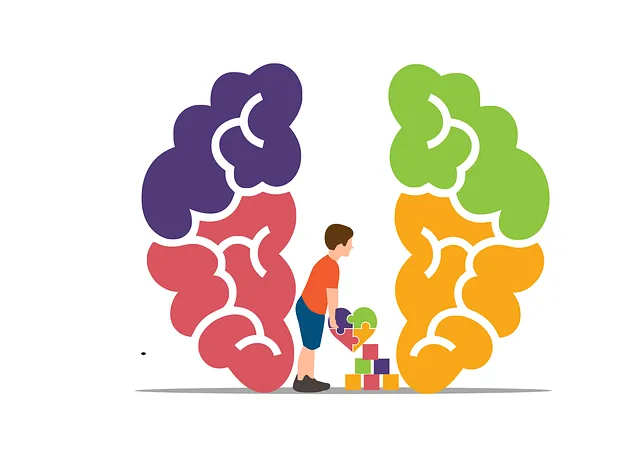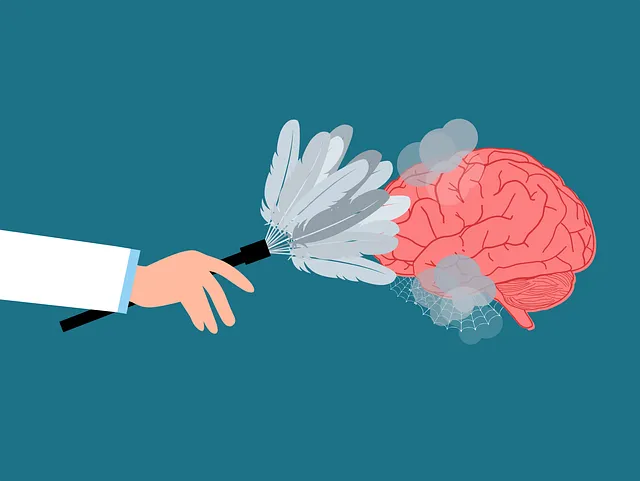Mental Wellness Self-Assessment tools, accessible through resources like the Kaiser Permanente psychiatry phone number in Boulder, aid individuals in evaluating their mental health and well-being. These comprehensive tools consider cultural, age, and personal factors, integrating elements from Mental Health Education, Self-Awareness Exercises, and Conflict Resolution Techniques. Suitable for both personal growth and professional settings, they promote proactive mental health management. Kaiser Permanente prioritizes emotional well-being through effective communication strategies and healthcare provider cultural competency training, making assessments inclusive and respectful of diverse backgrounds. By combining mood management, crisis intervention, and daily functioning evaluations, these tools cater to various populations, empowering users to understand their mental wellness holistically. Digital platforms further enhance accessibility, offering tailored interventions for stress management and trauma support. Cultural sensitivity ensures equitable mental healthcare, reaching underrepresented groups and building trust through respectful care.
Mental wellness self-assessment tools play a pivotal role in identifying and addressing psychological issues early. This article explores the development of such tools, focusing on key components for effective assessment and integrating technology for personalized support. We delve into enhancing accessibility and cultural sensitivity, highlighting resources like the Kaiser Permanente Psychiatry Phone Number Boulder, offering guidance to those seeking mental health services. By understanding these aspects, we can create comprehensive assessment tools that cater to diverse needs.
- Understanding Mental Wellness Self-Assessment Tools
- Kaiser Permanente Psychiatry Phone Number Boulder: A Resource for Guidance
- Identifying Key Components for Effective Assessment
- Integrating Technology: Digital Tools for Personalized Support
- Enhancing Accessibility and Cultural Sensitivity in Assessment Tools
Understanding Mental Wellness Self-Assessment Tools

Mental Wellness Self-Assessment tools are designed to help individuals gain a deeper understanding of their mental health and well-being. These tools, often accessible via platforms like the Kaiser Permanente psychiatry phone number Boulder, provide a means for self-reflection and evaluation. They can range from simple questionnaires to more complex assessments, each offering insights into various aspects of mental wellness. By encouraging self-awareness, these tools empower individuals to take charge of their mental health and identify areas that may require support or professional intervention.
The development process involves careful consideration of factors like culture, age, and individual preferences to ensure accessibility and effectiveness. Incorporating elements from Mental Health Education Programs Design, Self-Awareness Exercises, and Conflict Resolution Techniques can enhance these tools’ utility. These assessments can be valuable resources for both personal growth and professional settings, promoting proactive mental health management.
Kaiser Permanente Psychiatry Phone Number Boulder: A Resource for Guidance

In today’s fast-paced world, maintaining emotional well-being is a constant challenge. For those in Boulder seeking professional guidance, Kaiser Permanente Psychiatry Phone Number Boulder offers a beacon of support. This dedicated resource provides easy access to expert advice and specialized care for individuals navigating mental health concerns. The phone number serves as more than just a contact point; it symbolizes a commitment to Emotional Well-being Promotion Techniques that cater to the unique needs of each person.
Effective communication is at the heart of successful treatment, making Communication Strategies an integral part of the services offered. Additionally, Kaiser Permanente understands the importance of Healthcare Provider Cultural Competency Training in providing inclusive and empathetic care. By fostering a space where individuals feel heard and respected, they ensure that mental wellness assessments are comprehensive and tailored to the diverse backgrounds and experiences of their patients.
Identifying Key Components for Effective Assessment

Identifying Key Components for Effective Assessment
When developing mental wellness self-assessment tools, it’s crucial to consider a comprehensive approach that caters to diverse individual needs. A well-rounded assessment should incorporate various aspects such as mood management strategies, crisis intervention guidance, and an evaluation of daily functioning. Incorporating these elements ensures the tool is adaptable to different populations, including those seeking support through a Kaiser Permanente psychiatry phone number in Boulder or participating in community outreach programs.
For instance, self-assessment questions should range from evaluating symptoms and emotional states to exploring relationships, work performance, and leisure activities. This holistic perspective enables individuals to gain profound insights into their mental wellness while aligning with the goals of organizations like Kaiser Permanente and community outreach initiatives focused on enhancing overall well-being.
Integrating Technology: Digital Tools for Personalized Support

In today’s digital era, integrating technology into mental wellness self-assessment tools has revolutionized personalized support. Apps and online platforms designed for emotional intelligence and coping skills development are becoming increasingly popular, offering accessible resources to those seeking guidance. These tools cater to diverse needs, from stress management to trauma support services, ensuring individuals receive tailored interventions regardless of their location. For instance, organizations like Kaiser Permanente in Boulder provide digital solutions that promote mental well-being, making professional assistance more reachable and convenient for many.
By leveraging technology, these platforms can offer continuous monitoring and adaptive recommendations, fostering a more engaged and effective self-care journey. Users can access resources tailored to their unique circumstances, whether it’s managing anxiety, improving mood regulation, or developing healthier coping mechanisms. This shift towards digital solutions not only broadens accessibility but also empowers individuals to take an active role in their mental wellness, complementing traditional services like the Kaiser Permanente psychiatry phone number Boulder residents rely on.
Enhancing Accessibility and Cultural Sensitivity in Assessment Tools

Making mental wellness self-assessment tools accessible and culturally sensitive is paramount to ensuring effectiveness and equity in mental healthcare. Tools like those developed by Kaiser Permanente, with resources available through their Boulder psychiatry phone number, play a crucial role in promoting early intervention and prevention. By offering assessments in multiple languages and considering diverse cultural contexts, these tools cater to a broader range of individuals, including those from underrepresented or minority backgrounds. This approach not only improves self-esteem and mental wellness but also facilitates better risk management planning for mental health professionals.
Cultural sensitivity in mental healthcare practice involves acknowledging and respecting the beliefs, values, and customs that shape an individual’s perception of mental health and illness. Incorporating this aspect into assessment tools helps reduce barriers to care, fostering trust and openness among users. Moreover, it enables mental health professionals to deliver more personalized and effective treatment plans, aligning with the evolving demands of a diverse society.
Mental wellness self-assessment tools play a pivotal role in promoting individual well-being, offering accessible and personalized support. By integrating resources like the Kaiser Permanente Psychiatry Phone Number Boulder, these tools provide an essential first step towards guidance and care. Through careful consideration of key components, cultural sensitivity, and technological advancements, we can create effective assessment methods that enhance mental health services for all.






